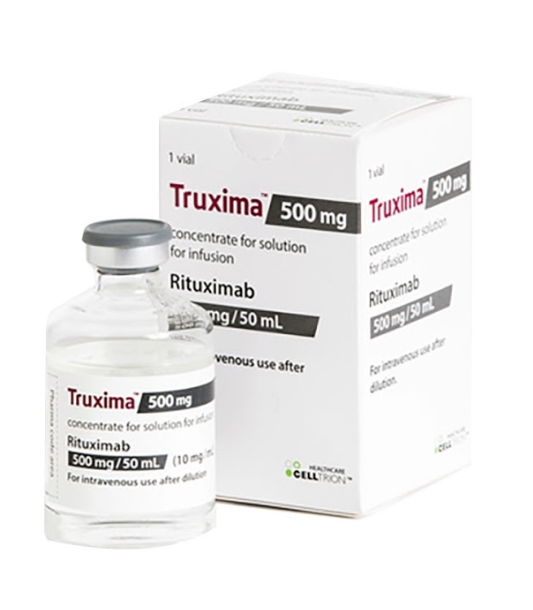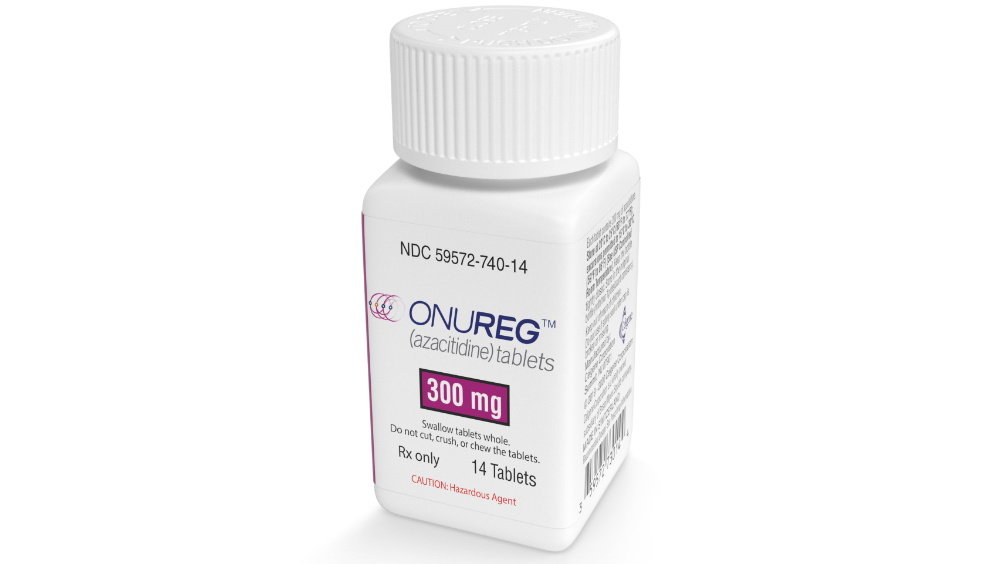Truxima (rituximab) vs Onureg (azacitidine)
Truxima (rituximab) vs Onureg (azacitidine)
Truxima (rituximab) and Onureg (azacitidine) are used to treat different conditions; Truxima is a monoclonal antibody used primarily for certain types of blood cancers, such as non-Hodgkin's lymphoma and chronic lymphocytic leukemia, by targeting CD20-positive B cells. Onureg, on the other hand, is an oral form of azacitidine, a hypomethylating agent used for the continued treatment of adult patients with acute myeloid leukemia (AML) who are in the first remission but unable to complete intensive curative chemotherapy. Therefore, the choice between Truxima and Onureg would depend on the specific type and stage of blood cancer a patient has, as well as their overall health, treatment goals, and the recommendation of their healthcare provider.
Difference between Truxima and Onureg
| Metric | Truxima (rituximab) | Onureg (azacitidine) |
|---|---|---|
| Generic name | Rituximab | Azacitidine |
| Indications | Non-Hodgkin's Lymphoma, Chronic Lymphocytic Leukemia, Rheumatoid Arthritis, Granulomatosis with Polyangiitis, Microscopic Polyangiitis | Acute Myeloid Leukemia (AML) in patients in first remission who are not able to complete intensive curative therapy |
| Mechanism of action | CD20-directed cytolytic antibody | DNMT inhibitor, induces hypomethylation of DNA |
| Brand names | Truxima, Rituxan, MabThera | Onureg |
| Administrative route | Intravenous infusion | Oral |
| Side effects | Infusion reactions, infections, body aches, tiredness, skin rashes | Nausea, vomiting, diarrhea, constipation, fatigue, hematologic abnormalities |
| Contraindications | Known hypersensitivity to rituximab or any of its components | Advanced malignant hepatic tumors, hypersensitivity to azacitidine or mannitol |
| Drug class | Monoclonal antibody | Hypomethylating agent |
| Manufacturer | Celltrion Healthcare, Teva Pharmaceuticals, Genentech (Roche) | Bristol Myers Squibb |
Efficacy
Truxima (Rituximab) Efficacy in Treating Leukemia
Truxima, a biosimilar to the original rituximab, is a monoclonal antibody that targets the CD20 antigen on the surface of B-cells. It is used in the treatment of non-Hodgkin lymphoma, a type of leukemia. The efficacy of rituximab, including Truxima, has been demonstrated in clinical trials where it has been used in combination with chemotherapy. In chronic lymphocytic leukemia (CLL), rituximab has shown to improve overall survival and progression-free survival when combined with chemotherapy compared to chemotherapy alone. The addition of rituximab to standard chemotherapy regimens has become a cornerstone in the treatment of B-cell leukemias, reflecting its significant impact on patient outcomes.
Onureg (Azacitidine) Efficacy in Treating Leukemia
Onureg (azacitidine) is an oral hypomethylating agent approved for the continued treatment of adult patients with acute myeloid leukemia (AML) who achieved first complete remission (CR) or complete remission with incomplete blood count recovery (CRi) following intensive induction chemotherapy and are not able to complete intensive curative therapy. Azacitidine has been shown to prolong overall survival in patients with AML in the maintenance setting. The VIALE-A trial demonstrated that azacitidine significantly improved median overall survival when compared to placebo in patients with AML in first remission following induction chemotherapy.
Both Truxima and Onureg play significant roles in the treatment of different types of leukemia, and their efficacy has been supported by clinical trials. Truxima is effective in improving outcomes in B-cell leukemias when used in combination with chemotherapy. Onureg is effective as a maintenance therapy in AML, prolonging the duration of remission and potentially improving overall survival. The use of these medications represents an important advancement in the management of leukemia, offering hope for better patient outcomes.
It is important for healthcare providers to consider the individual patient's disease characteristics, prior treatment history, and overall health when determining the use of Truxima or Onureg. Ongoing research continues to refine the use of these medications and to explore their potential in other settings within the spectrum of leukemia treatment. As with any medication, the benefits must be weighed against the potential risks and side effects, and decisions should be made in the context of evidence-based guidelines and personalized patient care.
Regulatory Agency Approvals
Truxima
-
European Medical Agency (EMA), European Union

-
Food and Drug Administration (FDA), USA

-
Health Canada

-
Therapeutic Goods Administration (TGA), Australia

-
Medsafe (NZ)

Onureg
-
Food and Drug Administration (FDA), USA

Access Truxima or Onureg today
If Truxima or Onureg are not approved or available in your country (e.g. due to supply issues), you can access them via Everyone.org.
How it works

Make an enquiry
Choose the medicine you want to buy, answer a couple of questions, and upload your prescription to speed things up. We’ll get back to you within 24 hours.


Make an enquiry
Choose the medicine you want to buy, answer a couple of questions, and upload your prescription to speed things up. We’ll get back to you within 24 hours.


Breeze through the paperwork
We'll guide you through the required documents for importing unapproved medicine, ensuring you have all the necessary information.


Get a personalized quote
We’ll prepare a quote for you, including medicine costs and any shipping, administrative, or import fees that may apply.


Receive your medicine
Accept the quote and we’ll handle the rest - sourcing and safely delivering your medicine.

Some text on this page has been automatically generated. Speak to your physician before you start a new treatment or medication.
Let's talk
If you have any questions, call us or send us a message through WhatsApp or email:
Contact us




